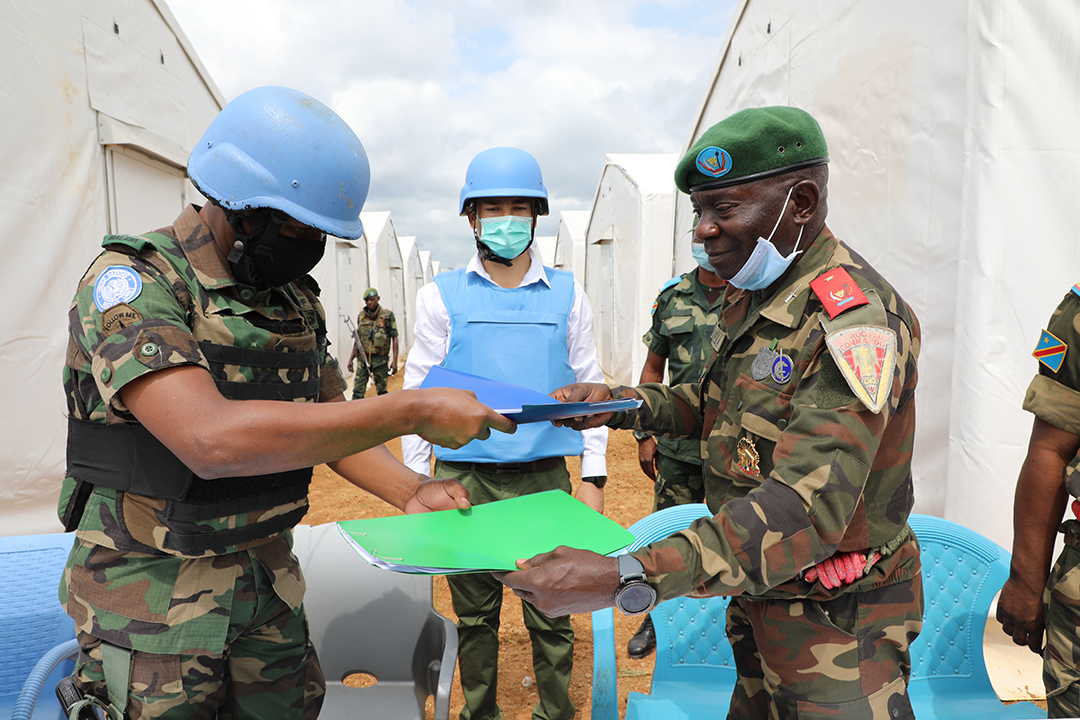U.N. Withdrawal in DRC Fraught With Risk
ADF STAFF
At the request of the Democratic Republic of the Congo (DRC), the withdrawal of the United Nations peacekeeping mission has begun.
But experts say the U.N.’s exit is likely to create an opening for armed groups in the east, which could worsen the violence.
U.N. Secretary-General Antonio Guterres said the mission, known as MONUSCO, will make an “accelerated withdrawal” and is entering “its final phase.”
However, he warned that security issues that have plagued eastern DRC for decades are “deteriorating sharply.”
“A premature departure of MONUSCO could have consequences for the civilians relying on the mission for their protection and safety,” he said in a report to the U.N. Security Council published on August 10. “Regional tensions have further worsened. The humanitarian situation has deteriorated considerably. Hundreds of thousands of civilians have been forcibly displaced.”
A recent report by the U.N. Group of Experts on the DRC accused Rwanda of illegally sending troops into DRC to support the ethnic Tutsi-led M23 rebel group. Rwanda has denied the allegations repeatedly.
In Guterres’ report, he said M23 fighters have “seized large swathes” of territory, “established parallel, illegal administrations” and carried out “arbitrary arrests and extrajudicial executions.”
“The number of acts of sexual violence against children more than doubled between 2021 and 2022,” he wrote.
The worst violence in eastern DRC has been in the North Kivu and Ituri provinces, where more than 100 armed groups operate and about 4 million people have been displaced.
Guterres also warned of the proliferation of local militias that increasingly have aligned in fighting alongside the Congolese military (FARDC).
“The multiplicity of self-defense groups made up of armed citizens, known as Wazalendo, who claim to be fighting the M23 to defend the territorial integrity of the Democratic Republic of the Congo, raises other security problems and could contribute to a new cycle of violence, including ethnically motivated attacks and reprisals,” he wrote in the report.
First deployed 25 years ago, MONUSCO had about 19,000 troops deployed and cost about $1 billion a year before beginning to draw down.
In recent years Congolese have grown increasingly angry about the mission’s inability to protect civilians or make significant progress toward peace or political solutions.
“MONUSCO continues to be a focus of popular discontent and frustration over its perceived inaction,” Guterres said.
The resurgence of M23 in eastern DRC in late 2021 triggered a backlash against the U.N. peacekeepers. MONUSCO said its peacekeepers could not continue supporting FARDC in the fight against M23, because the rebels are better equipped.
Congolese officials and citizens were outraged.
Four peacekeepers and 32 civilians were killed in violent protests in July 2022, prompting the DRC to reassess MONUSCO’s conditions-based plans to depart by the end of 2024.
“The transition plan was formulated in 2021,” MONUSCO spokesperson Ndeye Khady Lo said in 2022. “The political and security environment a year later has changed significantly.”
The U.N. extended MONUSCO’s mandate in December 2022 despite the Congolese government’s request of an expedited withdrawal. Guterres’ newly announced timeline of withdrawing by the end of 2023 ends any potential for further debate on extending the mandate.
Several MONUSCO offices already have closed.
The 2022 protests led to MONUSCO departing Butembo, North Kivu. U.N. troops in the southeast Tanganyika province left in June 2022. In 2023, MONUSCO has withdrawn from Kasai and Kasai-Central provinces in central DRC.
FARDC has struggled to protect civilians in three decades of fighting in the eastern part of the country. Soon, thousands of MONUSCO troops and police officers will no longer be there to help.
The East African Community’s regional force remains deployed in the eastern region, and the Southern African Development Community plans to enter the fray as well.
During a June 7 visit to DRC capital Kinshasa, U.N. Under-Secretary-General for Peace Operations Jean-Pierre Lacroix said MONUSCO should withdraw “as quickly as possible … but do so responsibly.”
“There must be no security vacuum, which would be fatal to these populations,” he said.


Comments are closed.